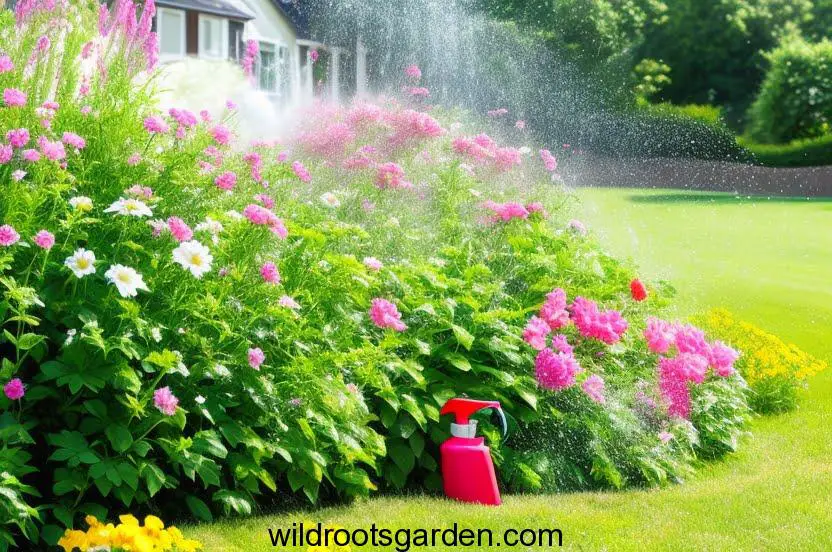Can I Spray Roundup in My Garden? Understanding Roundup Safety in Gardens
Many gardeners turn to herbicides like Roundup to maintain a beautiful, weed-free landscape. However, rising concerns around Roundup safety in gardens have prompted many to question its use. In this article, we’ll explore its safety, effective application techniques, and some eco-friendly alternatives, ensuring you can make an informed decision for your garden.
The Safety of Roundup in Gardens
Roundup, with glyphosate as its active ingredient, is designed to target a variety of unwanted plants and weeds effectively. This herbicide functions by inhibiting a specific enzyme crucial for plant growth, effectively eliminating the unwanted vegetation. While Roundup is generally safe for most desired plants when used correctly, caution is vital.
Application Tips for Minimizing Harm:
To reduce the risk of inadvertently damaging your cherished flora, consider employing targeted spraying methods. This means applying Roundup directly to the weeds or unwanted plants rather than spraying indiscriminately. Spot treatments can significantly minimize collateral damage to desirable species.
Is Roundup Safe for Humans?
The safety of Roundup for human use has been a hot topic. The International Agency for Research on Cancer (IARC) has classified glyphosate as possibly carcinogenic to humans. However, regulatory agencies such as the U.S. Environmental Protection Agency (EPA) declare that when applied according to label instructions, Roundup is safe for use.
Protective Measures:
To ensure your safety while using Roundup, it’s important to wear appropriate protective gear. Long sleeves, long pants, gloves, and safety goggles are essential. Additionally, avoid applying the herbicide during windy conditions to prevent drift, which could pose risks to both you and your desirable plants.
Environmental Considerations of Roundup
Another aspect to consider when using Roundup is its potential environmental impact. Glyphosate can leach into the soil and contaminate nearby water sources, posing a threat to aquatic life. To minimize negative environmental consequences, it’s essential to:
– Avoid spraying near water bodies.
– Limit the frequency of use.
– Consider your local ecosystems and opt for alternative methods when necessary.
Alternatives to Roundup
If you’re hesitant about using Roundup, several eco-friendly weed control methods can be equally effective:
Organic Weed Control Methods
Utilizing organic methods can provide a sustainable approach to weed management. Techniques include:
– Manual Weeding: Hand-pulling weeds can be labor-intensive but is a chemical-free and effective strategy.
– Mulching: Applying organic or non-organic mulch helps suppress weeds while enriching the soil.
– Weed Barriers: Materials like cardboard or landscape fabric can block weeds naturally.
Natural Herbicides
Natural herbicides made from non-synthetic ingredients, such as vinegar or essential oils, offer another alternative. While they might be less potent than traditional herbicides, they can effectively control light to moderate weed infestations without the same risks associated with synthetic options.
Tips for Using Roundup Safely in the Garden
If you decide to use Roundup in your garden, follow these essential guidelines for safe and effective application:
1. Read and Follow the Label Instructions: The label contains critical information regarding application rates, timing, and safety precautions. Adhering to these guidelines is vital for both efficacy and safety.
2. Wear Protective Clothing and Gear: Equip yourself with long sleeves, long pants, gloves, and safety goggles. If working in enclosed spaces or applying the herbicide for extended periods, consider using a respirator.
3. Avoid Spraying on Windy Days: Wind can easily carry herbicide droplets, leading to unforeseen drift and potential damage to nearby plants or risk to humans. Choose a calm day for application.
4. Use Targeted Application: Apply Roundup directly to weeds rather than broadcasting it widely to minimize unwanted damage.
Conclusion
With the right precautions, using Roundup in your garden can be a viable option for effective weed management. However, it’s crucial to weigh the implications on your plants, your health, and the environment. Being knowledgeable about Roundup safety in gardens can help ensure you manage weeds effectively while protecting your garden’s overall health.
FAQs
Is Roundup safe for all types of plants?
Generally, yes, Roundup is safe for most plants when used as directed. Careful application is key to preventing damage to desirable plants.
Can Roundup cause health issues in humans?
Although classified as possibly carcinogenic, glyphosate is considered safe when applied correctly. Recommended safety precautions are a must.
Are there natural alternatives to Roundup?
Yes, organic methods such as hand weeding and mulching, as well as natural herbicides that use vinegar or essential oils, can serve as effective alternatives.
How can I minimize Roundup’s environmental impact?
To reduce environmental harm, avoid spraying near water sources and use Roundup sparingly. Consider employing alternative weed management techniques in sensitive areas.
Can Roundup be used in vegetable gardens?
Caution is necessary when using Roundup in vegetable gardens. Aim the spray away from edible plant parts and consider organic methods if you’re concerned about herbicide use.

